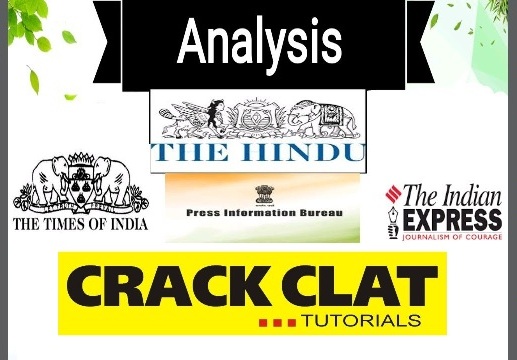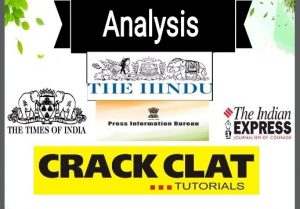Analysis of Important Editorials for CLAT – Law Illegal
UP’s ‘love-jihad’ ordinance has chilling effect on freedom of conscience
CONTEXT:
- The freedom of conscience means nothing if every act of religious conversion is going to be presumed illegalunless provenotherwise.
- The UP ordinance’s failure to prohibit forcible reconversionis also deeply disturbing.
WHAT DOES THE ORDINANCE ENTAIL?
- The governor of Uttar Pradesh has recently promulgated an ordinance to prohibit unlawful conversion from one religion to another.
- The Uttar Pradesh Prohibition of Unlawful Conversion of Religion Ordinance, 2020, as it is called, seeks to prevent love jihad in the state by criminalising,among other things, marriages carried out solely for the purpose of religious conversion.
- The ordinance makes it a criminal offence for a person to convert another by coercion, misrepresentation, fraud etc,which is unobjectionable.
RECENT PROCEEDINGS ON LOVE-JIHAD:
- A marriage solemnised for the sole purpose of unlawfully converting the bride or the groom is required to be declared void by the competent court.
- A person who wishes to convert to another religion (including to Hinduism) now has to follow a somewhat cumbersome process issuing a declaration to the district magistrate, both before and after the conversion, and subjecting oneself to an enquiry by the district magistrate.
WHAT IS LOVE-JIHAD?
- Love Jihad or Romeo Jihad is an Islamophobic conspiracy theory alleging that Muslim men target women belonging to non-Muslim communities for conversion to Islam by feigning love.
- The movement has also been described as antifeminist due to paternalisticattitudes towards women’s choice in marriage and by allegedly using women’s rights as a cover for Hindu nationalism.
- The concept rose to national attention in India in 2009 with alleged conversions first in Kerala and subsequently, in Karnataka.
WHO CAN CONVERT AND HOW UNDER THE PROPSED LAW?
- Under the new proposed law, anyone wanting to convert into another religion would have to give it in writing to the District Magistrate at least two months in advance.
- The government is supposed to prepare a format for the application and the individual has to fill the application for conversion in that format.
- However, under the new law, it would be the responsibility of the one going for the religious conversion to prove that it is not taking place forcefullyor with any fraudulent means.
- In case, any violation is found under this provision, then one faces a jail term from 6 months to 3 years and fine of minimum Rs 10,000.
WHAT MAKES THE ORDINANCE UNCONSTITUTIONAL?
There are several provisions in the ordinance which could plausibly be identified as unconstitutional.
- The ordinance, as it is presently drafted, dangerously imperils the freedom of conscience and the right to profess, practise and propagate religion under Article 25 of the Constitution.
- For instance, the ordinance makes it a criminal offence to convert a person by offering her an “allurement”.
- The term allurement is defined very broadly, to include even providing a gift to the person who is sought to be converted. This means that if a person offers a copy of the Bhagavad Gita to a non-Hindu, and the non-Hindu decides to convert to Hinduism after reading it, the conversion could be said to have taken place by allurement since it occurred after a gift was given to the convert.
ARTICLE 25:
Article 25 allows for the freedom of conscience and free profession, practice and propagation of religion
(1) Subject to public order, morality and health and to the other provisions of this Part, all persons are equally entitled to freedom of conscience and the right freely to profess, practise and propagate religion
(2) Nothing in this article shall affect the operation of any existing law or prevent the State from making any law.
THE CONCEPT OF ‘ALLUREMENT’:
- If a preacher simply encourages her listeners to convert to another religion by arguing that her religion has more persuasive tenets than theirs – this amounts to illegal allurement under the ordinance?
- The essential prerequisite of a criminal law is that it has to be precise.
- A person cannot be put behind bars for doing something that a penal law does not clearly and unequivocally prohibit.
- On this touchstone, the definition of allurement leaves much to be desired. There can be no quarrel with the ordinance’s premise that converting somebody by fraud or misrepresentation is wrong. After all, no person should be forced to convert to another religion against her will.
- In fact, though the members of the Constituent Assembly included the right to propagate one’s religion in the chapter on fundamental rights, they considered it a rather obvious doctrine that this would not include forcible conversions.
CONSTITUENT ASSEMBLY:
- In 1934, M N Roy first proposed the idea of a constituent assembly.
The British accepted the demand for the formation of a Constituent Assemble in 1940.
- Under the Cabinet Mission plan of 1946, elections were heldfor the formation of the Constituent Assembly.
- The members of this assembly were elected indirectly, i.e., by the members of the provincial assemblies by the method of a single transferable vote of proportional representation
- The constituent assembly was formed for the purpose of writing a constitution for independent India.
- Initially, the number of members was 389.
- In reference to the religious context,“Forcible conversion is no conversion”,Sardar Vallabhbhai Patel had said in one of the sub-committees of the assembly, adding, we won’t recognise it.
CRITIQUE OF THE UP ORDINANCE:
- It says that reconversionto a person’s previous religion is not illegal, even if it is vitiated by fraud, force, allurement, misrepresentation and so on. In other words, if a person converts from Religion A to Religion B of her own volition, and is then forced to reconvert back to Religion A against her will, this will not constitute conversion under the ordinance at all, and falls completely outside the ambit of the law.
- Through this peculiar provision, the law seems to send an unmistakable signal to its target audience: Prohibit illegal conversion to other religions, but look the other way if a convert is forced to reconvert back to ours.
- Illegal conversion under the ordinance attracts a punishment of 1-5 years in prison.However, if the victim of the illegal conversion is a minor, a member of the Scheduled Castes or Scheduled Tribes or, strangely, a woman, the punishment is doubled at 2-10 years behind bars.
- In other words, it does not matter who the woman is. She may be a highly educated CEO of a multinational company. Yet, if somebody converts her against her will, the punishment can go up to 10 years in prison, as against somebody who illegally converts her male subordinates, who will get five years in prison at the most.
- The ordinance unfairly paints all women with the same brush assuming that all women, and not merely women from historically marginalised or economically weak groups, are gullible, vulnerableand especially susceptible to illegal conversion.
- Perhaps the most striking provision of the ordinance is the one which deals with theburden of proof.Ordinarily, when someone makes an allegation that something has happened, it is up to her to prove it. The burden of proof in criminal cases is on the prosecution, and the presumption is that a person accused of committing an offence is innocent until proven guilty.
- The Uttar Pradesh ordinance turns this rule on its head. Every religious conversion is presumed to be illegal. The burden is on the person carrying out the conversion to prove that it is not illegal.
8.The offence of illegal conversion is also cognizable and non-bailable, meaning that a police officer can arrest an accused without a warrant, and the accused may or may not be released on bail, at the discretion of the court.
REV STAINISLAUS VS STATE OF MADHYA PRADESH:
- In Rev Stainislaus vS State of Madhya Pradesh (1977), a bench of five judges of the Supreme Court held that the fundamental right to propagate religion does not include the right to convert a person to another religion.
- In that case, the court had upheld anti-conversion statutes enacted by the states of Orissa and Madhya Pradesh, which imposed somewhat similar (even if slightly less extreme) restraints on the freedom of conscience and the right to propagate religion.
CONCLUSION:
In view of the recent ordinance, perhaps it is now time to revisit that judgment because the freedom of conscience means nothing if every act of religious conversion is going to be presumed illegal unless proven otherwise.
December 03, 2020 : The Indian Express
#clat #clatcoaching #clat2021 #crackclat #lawexams

